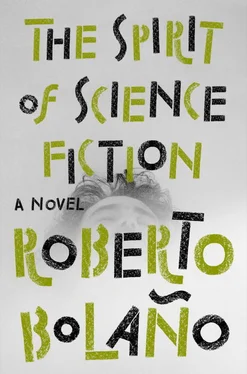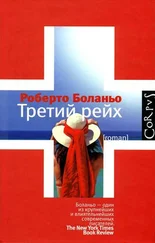“I’d rather read it.”
“It isn’t written, it’s an oral story.”
El Mofles smiled, blushing, wiped his hands on a rag, and put on water for the last round of Nescafé. Suddenly I realized that I was scared, panicked; I thought of a thousand different ways that things could end badly, seeing myself first at the police station and then at the hospital, every bone in my body broken. We drank our coffee. In silence I listened to the final instructions. When we went outside, the street looked dark and deserted. Without a word, José Arco got on my motorcycle and started it. The roar of the tailpipe made me shudder. Then he got on his bike, and we rolled down the street to the end of the block, testing the engines. We turned, with me always close behind, and returned to where El Mofles was waiting for us.
“You’ve made it like new,” said José Arco. I was silent, all my senses focused on keeping the engine from stalling. Take care and come back soon, said El Mofles. Of course, said José Arco. How do you feel, Remo? Scared shitless, I said. It was strange—the sound of our voices was muted, even the sound of the bikes seemed to come from far away; meanwhile the sounds of the sleeping street were magnified in my ears: cats, the first morning birds, water running in the pipes, some distant door, the snores of a man in a house down the block.
“All right, you’ll get over it; we’ll go slow, stay right next to each other.”
“Okay,” I said.
“See you around, Mofles.”
“Good-bye.”
We coasted out of the neighborhood as if we were on bicycles. Every so often, José Arco asked me how I was doing. Soon we left the empty streets of El Mofles’s neighborhood and turned onto a wide avenue.
“Stick close to me,” said José Arco.
The two motorcycles lurched forward. I felt as if somebody had given me a kick somewhere in my insides. My hands were sweating, and I was afraid they would slip off the handlebars. Several times I thought about braking, but I was prevented by the certainty that if I did, the Aztec Princess would be left lying abandoned in the street while I went home on the Metro. At first all I could see was the asphalt lane, interminable and full of silences suddenly broken, and the hazy outline of my friend and his Honda, sometimes moving ahead of me and other times letting me move ahead. Then, as if a curtain was drawn back in the middle of the desert, a hulking mass appeared on the horizon, gigantic but far in the distance, seeming to flicker or cycle through every shade of gray in the world through the fine mist of rain. What the hell is that? I screamed in my head. The Turtle of Death? The Great Beetle? The thing was as big as a hill, I calculated, and it was coming straight at us, propelled by pseudopods or perhaps on a cushion of steam. Its progress, from where I sat, was unrelenting. I didn’t need to ask José Arco which way we were going.
“La Villa!” he called, pointing his finger at Godzilla.
“La Villa, La Villa!” I shouted happily.
Only then did I notice the cars passing us; the half-hidden stoplights, corroded by smog, flashing on and off at the corners; the shadowy figures moving along the sidewalk, even smoking cigarettes; the buses, lit up like riverboats, carrying workers to their jobs. In the middle of the street, a kid, drunk or high, called out to death and then fell to his knees, impassively watching the cars go by. From inside a coffee shop that had just opened its doors came the strains of a ranchera.
We stopped near the plaza in front of the basilica to stretch our legs and to see how I was doing so far on my first motorcycle ride. I told José Arco that a minute ago I’d been convinced that the basilica was a monster. Or a petrified atomic blast striding toward us. If that’s what it was, wouldn’t it be heading toward the center of the city? Maybe, I said, but still, we were in the way. Good thing you’re all right. How is the Aztec Princess behaving? Isn’t she a nice bike?
I don’t know why, but the air seemed to be coming at us from a hole in the clouds. I lit a cigarette and said yes.
“Well, it wasn’t an atomic bomb,” said José Arco as he cast an eye over my motorcycle. “It was the castle of the Virgin of Guadalupe, mother of all, the great babe.”
“Yes,” I said watching the sunrise, which was only the faintest glow so far. “She’s the one who saved me from getting into an accident.”
“No, man, that was me and Mofles, we’re pedagogues of the wheel.”
I felt in my pockets for coins.
“Wait for me a minute, I’m going to make a phone call.”
“All right.”
Nearby I found a public phone and called Laura. After a long time, her mother picked up. I apologized for calling so early and asked if she would be so kind as to get Laura. It’s urgent, I think; I don’t know, I said, playing dumb. I wasn’t tired, but I would have been happy to flop down on my mattress. The streets were bright, and next to me a couple of taxi drivers were talking about soccer—one liked Club América and the other preferred Guadalajara. When Laura came on the line, I apologized again, exactly as if I was back on the line with her mother, and then I told her that I loved her.
“It’s hard to explain. I’m in love with you.”
Laura said, “It’s nice that you called.”
“That’s all I wanted to tell you, that I love you.”
“Great,” said Laura. “That’s great.”
We hung up, and I went back over to the motorcycles.
“Everything okay? Ready to go?”
“Yes,” I said, “let’s go.”
“Do you think you can make it home?”
“Yeah, sure.”
“I’ll come with you anyway.”
“There’s no need. You must be tired.”
“Tired? Me? No, man, and anyway, I still haven’t told you the story of Isidore Isou and Altagor.”
“What shit is that?”
“El Mofles’s story, man, wake up.”
We headed toward the center of the city, taking our time. The air finally cleared my head. It was nice to ride along on the bike and watch the streets and windows begin to wake up. People who’d been out all night drove their cars home or wherever, and workers drove their cars to work or piled into the vans or waited for the buses that would take them to work. The geometric landscape of the neighborhoods, even the colors, had a provisional look, filigreed and full of energy, and if you sharpened your gaze and a certain latent madness, you could feel sadness in the form of flying sparks, Speedy Gonzales slipping along the great arteries of Mexico City for no reason at all or for some secret reason. Not a melancholy sadness but a devastating, paradoxical sadness that cried out for life, radiant life, wherever it might be.
“It’s a strange story,” shouted José Arco. “I won’t insult you by asking if you know who Isou and Altagor are.”
“Go ahead and insult me, I have no idea.”
“Really? Fucking Latin America and its fucking young intellectuals!” José Arco laughed.
“Well, Isou is French,” I yelled. “And he writes visual poetry, I think.”
“Cold, cold.”
Then he said something that I didn’t understand—it was in Romanian—and we passed a truck loaded with chickens and then another truck loaded with chickens and another and another. It was a convoy. The chickens poked their beaks through the mesh of their cages and shrieked like teenagers on the way to the slaughterhouse. Where is my mother hen? the chickens seemed to say. Where has my egg gone? My God, I thought, I don’t want to crash. La Salud Poultry Farm. José Arco’s Honda drew up an inch or so from mine.
“Isou is the Father of Lettrism and Altagor is the Father of Metapoetry!”
“Wonderful!”
“And they hate each other bitterly!”
Читать дальше












